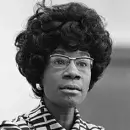
Shirley Anita Chisholm
Shirley Anita Chisholm was the first African American woman elected to the United States Congress in 1968 and the first woman and African American to seek the nomination for president of the United States from one of the two major political parties in 1972. In Congress, she represented New York’s 12th Congressional District (Bedford-Stuyvesant section of Brooklyn) for seven terms from 1969 to 1983.
Born in Brooklyn and raised in Brooklyn and Barbados, she was educated at Brooklyn College (B.A., cum laude, in sociology, 1946) and Teachers College at Columbia University (M.A. in childhood education, 1951). In Congress, “Fighting Shirley” introduced more than fifty pieces of legislation and championed racial and gender equality, the plight of the poor, and ending the Vietnam War. Chisholm worked to expand the food stamp program and helped to create the Special Supplemental Nutrition Program for Women, Infants, and Children.
In 1971, she became a founding member of the Congressional Black Caucus and cofounder of the National Women’s Political Caucus. In 1977, Chisholm became the first Black woman and second woman ever to serve on the House Rules Committee. In 1977, she was also elected as Secretary of the House Democratic Caucus. Her 1972 campaign for the Democratic presidential nomination received 152 first-ballot votes at the convention, fourth place behind George McGovern’s winning total. Chisholm retired from Congress in 1983. She taught at Mount Holyoke College, where she held the Purington Chair in Politics and Women’s Studies until 1987.
In 2015, Chisholm was posthumously awarded the Presidential Medal of Freedom by President Barack Obama, and in 2024 she was posthumously awarded the Congressional Gold Medal.